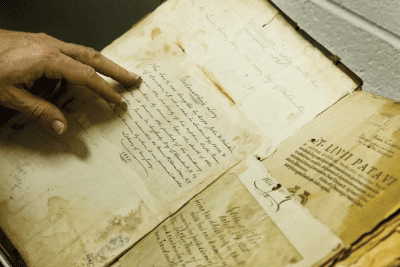
“To some people, dusty old books are often just dusty old things to get rid of,” says Shaw, a reference librarian at the New Jersey State Library in Trenton.
Shaw arrived at the State Library four years ago and took a special interest in the institution’s rare-books collection. His special joy is sharing what he discovered with the public.
The rare-books collection—one of several special collections at the State Library—boasts more than 3,000 titles, including works from the private collection of David Brearley, a New Jersey signer of the Constitution; Pennsylvania state legislature records printed by Benjamin Franklin; and the first United States atlas. The library, which was founded in 1796, is nestled between the New Jersey State Museum and the State House in the capital complex on West State Street. It serves as a research institution for the state government and as a rich resource for the public.
“We really have two treasures at the New Jersey State Library,” says state librarian Norma Blake. “We have our rare-books collection and we have John Shaw, though he’s not as old as the other stuff.”
Shaw, 61, worked at AT&T Bell Labs for 29 years as a science and technology librarian. After accepting the State Library job, the Toms River resident was immediately intrigued by the institution’s history and some of its oldest books.
“I instantly wondered if we still had any of the early books from the library’s founding,” he says. “Naturally, I got curious and went down to the basement to poke around.”
In his search, Shaw stumbled upon a report detailing the library’s early collection, using the eighteenth century New Jersey State Legislature’s minutes, which recorded all the books purchased or acquired during the library’s early days. Armed with this document as a treasure map, Shaw began to track down the items. One book led to another, and the rest, as they say, is history (literally).
Shaw decided to haul some of the original books out of the vault and put together a presentation titled, “The Past is Present at the New Jersey State Library,” first for the library staff, and then for the public. Despite being rated OB (“Old Books—discretion is advised for those who may find the discussion of old books dull, tedious, humdrum, monotonous, dreary, stodgy, or pedestrian”), the presentation received rave reviews.
“I learned so much about New Jersey’s history that I never knew before,” says associate state librarian Tina Keresztury. “So I got to thinking, I am a librarian and I don’t know much about it; there must be people all over the state who don’t either.”
The staff is hoping to take the show on the road—and schedule further presentations at the library—so that more people can take a trip back in time with Shaw.
“You can pull a book off the shelf and you begin to find stories about the people of the time, what was happening, things about the author or the printer or what roles the books played,” Shaw says. “For instance, some books have names in them. But what’s really nice about the colonial period is America was such a small place compared to today, so anyone mentioned usually turns out to be historically important.”
Shaw’s knowledge and his dry sense of humor combine to make his presentations interesting, says Keresztury. “He gets a twinkle in his eye when he talks about these books because he just loves sharing them with others.”
“The physical books themselves have an aura about them that appeals to me,” Shaw says. “I like having books around me, just as you like having people around you. They’re my friends.”
To celebrate National Library Week (April 12-18), Blake encourages “all New Jersey residents to come see our collection and learn each book’s significance to the state’s history.”
“The only thing we really know about the past is what people wrote down,” Shaw says. “And libraries are one of the places where we save the written word and preserve it for the future.”
To learn more about the rare-books collection, visit njstatelib.org.



